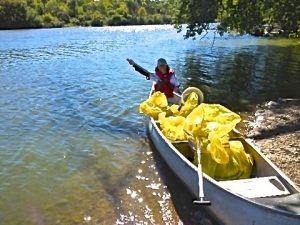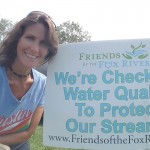Protecting the River: Monitoring, Advocacy and Action
Water quality is the “canary in the coal mine”. Detecting pollution and better yet, determining its source, is our first line of defense in protecting the Fox River. Citizens and taxpayers cannot rely on local, state or the federal government to fully protect our local resources. Certainly neither the State, nor local counties, have the resources, or interest, in monitoring water quality in every tributary, in every sub-watershed.
Our plan calls for increasing funding for our existing monitoring program by reaching out to wastewater treatment plants throughout the watershed whose operating permits require them to do outreach to their customers and provide public education about water quality and stormwater. Since most operators serve small communities, and IEPA has not enforced their compliance with this requirement, few commit any funds for this purpose. We anticipate that some operators will respond to our appeal for funding our public outreach and education efforts and we can increase our funding for these efforts.
Love Our River Days
In 1990, the national river protection organization, American Rivers designated the Fox River as one of the most endangered rivers in the U.S. The Fox has come a long way from those days. It’s cleaner, there are more fish (and fishing birds), there’s more recreational access, and some of the useless dams are gone. So we have a lot to celebrate.
Friends of the Fox River used to run “River Rescue Days” to clean up the river and raise consciousness about the threats to its recovery. But through our new focus on changing our culture, we’re changing how we “frame” our cleanups from “rescues” and “workdays”, to “celebrations” of our progress and successes. We’re changing our orientation in producing these events from “dedicated volunteers doing community service” to “a community celebration of the river for all ages”.
We will expand our “cleanups” into a mini festival of events with music donated by live bands, food donated by local restaurants and stores, raffles and contests with prizes donated by local businesses, and exhibits & demonstrations provided by FOTFR and our environmental partners. And oh yes, were going to go down by the river and pick up litter, but we’re even going to do that differently.
Litter Reduction Program
As long as the sky is blue and the winds blow from the west (or east), what we drop, or carelessly throw away, will find its way down to our north/south river. But if all we do is pick it up every year, we will have to do it forever.
Some litter can be eliminated. Bait shops can switch from Styrofoam containers to something more biodegradable, nearby business can put up trash fences, and recreational user groups can be educated and engaged in litter reduction.
The International Beach Sweep provides a good model for creating a local program. Litter is picked up from beaches around the world (on the same day), each piece is recorded, and the data is compiled and analyzed. By identifying the types of litter, it becomes possible to determine some of the sources which can then be reduced, or eliminated. So we will recruit and train a team of date recorders at each “Love the River Day” event prior to conducting a community “cleanup”.
Creek Caretakers
We will also revive our adult volunteer Fox River Watershed Monitoring Network and transform the program from simply monitoring water quality, into a stream stewardship network throughout the Fox River watershed with a new “Creek Caretakers” program. We will recruit, train and support volunteers to adopt a tributary or stretch of stream close to the home or workplace. Creek Caretakers will monitor water quality and other conditions on their stretch, get to know the riparian owners, conduct a community event once a year, and be the local expert and advocate for their stream.
Action Alert Network
The degradation of streams and rivers by insensitive development begins long before a developer paves a parking lot, or a county’s contractor begins building a bridge. Permits must be applied for, zoning hearing held, properties inspected and other steps must be taken. Some of these steps allow, or require, public notice. But to stop dumb development, someone in the public must notice. To oppose un-needed or un-wanted projects, someone must show up for a hearing. And to help stop the worst decisions being made at any level, someone must write a letter or make a call.
To protect our local natural resources before a damaging project is approved or begun, our Plan calls for the creation of an “Alert Action Network” to organize, train, coordinate, and mobilize members and volunteers to take simple actions to help us protect the Fox River and its watershed. Washington can repeal the Clean Water Rule, but local citizens acting together, can protect our so-called “dis-connected” wetlands and small streams from the damaging development to which the Rule’s repeal exposes them.
Strategic-Plan-Protection



